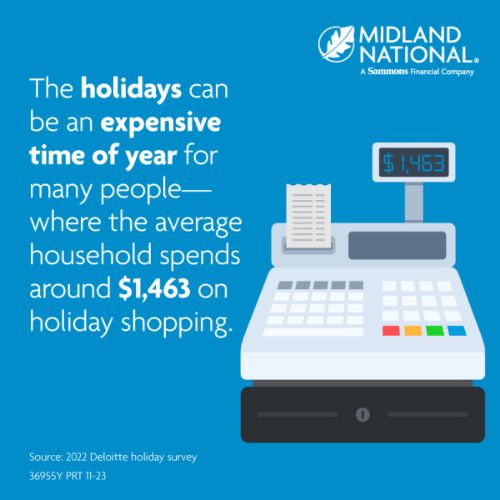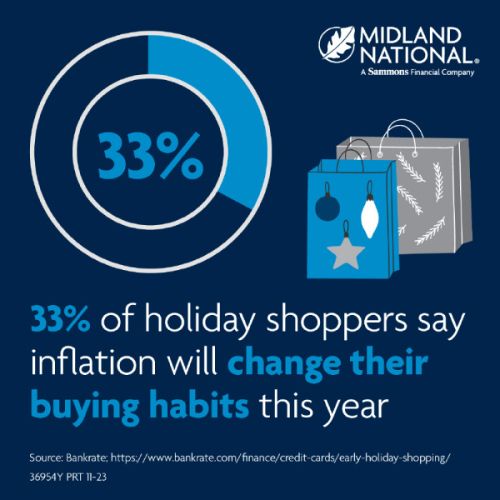
Top budgeting tips to help you avoid holiday overspending
Jul 22, 2024, 3:15:33 PM | Reading Time: 5 minutesThe holidays can be an expensive time of year for many people—where the average household spends around $1,463 on holiday shopping, and 36% of Americans take on debt going into the New Year. Plus, with rising inflation and a growing cost of many items, the dollar just doesn’t go as far as it used to. If you have several people on your gift-giving list, the financial strain of the holidays can become a genuine concern. Setting some ground rules for yourself and creating a holiday budget can help prevent overspending and celebrate the season without the increased stress and worry.
Establishing a holiday budget
Creating a budget is one of the most important steps in preparing for holiday spending. When you have a set amount in mind before heading into the holidays, you can help steer clear of unnecessary expenses and give yourself a clear framework to prioritize what you need to buy. This budget can also include travel expenses, food and drink costs, and purchases needed for events or gatherings. If this makes sense for your financial situation, you can break down your holiday budget into these categories and estimate how much you will need to spend on each.
How do you budget for holiday spending?
To financially prep for holiday expenses, you can create a budget and keep track of your spending in various ways. If you prefer a written method, use a notebook with a folder to keep a running tally of all your expenses and receipts. An electronic spreadsheet can also work well, allowing you to subtract automatically each incoming expense from your total.
You may also wish to take advantage of the many budgeting apps that are now available that let you track spending, categorize expenses, set goals, and connect with your accounts. When creating a holiday budget, you can set limits for each category and set up notifications to alert you if you’re approaching your max amount. However you choose to set up your budget, monitoring your spending will help you avoid overloading your credit cards and allow you to step into January in good financial standing.

Shooting for a debt-free holiday season
If you make a point to establish your budget early in the year, you can begin to set aside money specifically for holiday expenses. This can help minimize the financial impact of holiday shopping and prevent the end of the year from becoming a money drain. If this money is only allocated for holiday-related purchases, you could pay off your credit card bill in full or in less time to help avoid an increased balance and interest fees.
Avoiding holiday debt
You’re not alone if the holidays are a stressful time of year for you. Over two-thirds of consumers (68%) expected holiday spending to worsen their stress levels this year. Along with proper preparation and budgeting, there are a few other ways to help lessen holiday anxiety and let yourself focus on enjoying time with family and friends. If possible, begin shopping well in advance, allowing the costs to be spread out. Look for sales and items on clearance throughout the year that can be set aside. You can also discuss other gift ideas with your loved ones, like taking a cooking class together, exchanging homemade gifts, venturing on a day trip, or organizing a movie night.
Utilizing a holiday savings account
To help you set aside money year-round for the holiday season, many financial institutions offer holiday savings accounts where you can routinely deposit money. Many of these accounts can only be accessed after a set date, which can help you avoid dipping into them for other purposes. Some accounts may also allow you to earn interest on your balance and make unlimited deposits. Check with your bank or credit union to see if they offer holiday accounts.

Controlling spending habits year-round
While your expenses may commonly increase during the holidays, you may also want to look closer at your overall spending habits and how you can tighten your budget to lessen the financial strain that may spike at year-end. As you review your finances, are there ways to cut costs? Do you spot any unnecessary spending? Perhaps you have streaming services or memberships you no longer use, or you could cut down on food delivery, eating out at restaurants, and excessive online shopping.
How to cut spending
Budgeting and finance tracking apps are great for the holidays and can help keep your spending in check all year long. Many apps allow you to track your budget on your computer or mobile device conveniently and can reveal valuable insight into your spending habits. Where is your money going each month? Are there categories where you could cut back your spending? By knowing exactly where your income is going each month, you can be better informed about how to save more and spend less.
Preparing for holiday shopping inflation
The rising costs of everyday items are on many people's minds, where 33% of holiday shoppers say inflation will change their buying habits this year. Rising inflation makes it even more challenging to stretch every dollar and avoid going into debt as purchases ramp up. You may need to decrease the number of items you buy this year, find inexpensive and creative ways to celebrate with loved ones and take advantage of coupons and discounts as much as possible. Some websites and apps allow you to compare shops to find the best deals. The holidays can be a fun-filled time of year but also a season that brings on extra financial and emotional stress. Become the best buds with your budget and plan as much as possible to help avoid overspending and carrying debt into the new year. By incorporating a few budget-friendly tips and tricks into your life, you can spend less time worrying about your expenses and more time enjoying the holiday season.
B1-MN-11-23
